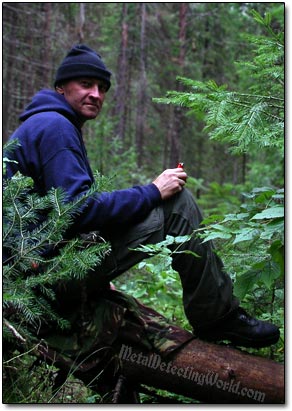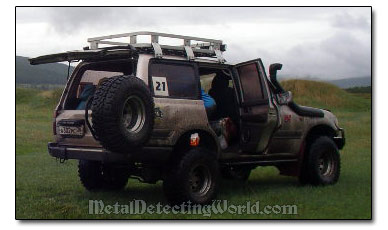Metal Detecting Research and Exploration - A Complete Guide, page 62
Footwork and Observation
SIMPLE SAFETY RULES TO FOLLOW WHEN HIKING IN WILDERNESS
Though footwork can result in amazing discoveries, it is not an easy activity to do. You definitely need to be in a good physical shape to walk long distances, sometimes through dense woods, or climb steep terrain. If you have to transect the area for the first time, and you can not use your 4x4, do not take a long hike right away.
Start with a small area first. Next time out, cover a little larger area. This gradual increase in walking distances will allow you to train your eyes and muscles, and master your breathing technique. Take a long break every time you start feeling tired, and drink lots of water to avoid dehydration. Always bring chocolate and dry fruits for extra energy.
Always remember that even a little fatigue can dull your mind, senses and perception; thus, making you miss an important spot, or worse - get yourself in trouble if you are in the wilderness. Footwork sometimes can be more extreme than regular hiking. And if you are "off the beaten path" in the woods, no matter how excited you can be, stay cool and alert, take frequent breaks (a 10-minute break every 30-45 minutes), make sure you know how to use a compass and read a map, make sure you know where you are, and mark your route so you could easily backtrack to civilization (or your vehicle) in case you get lost.
Listening to your surroundings is as important as observing them. Stop and stay alert when you hear cracking of dry branches and sticks under walking animal. Also listen for sudden cry of some forest birds such as Jay which usually signals movements of humans or large animals through the woods. However, you would never know whether it has spotted you or something else.
Few animals will attack except in self-defence, but keep away from animal watering spots. Before you know it, most of them will hear or catch your smell and try to avoid an encounter. When some curious animals do not want to leave right away, make noise by simply striking a stick against a large tree to drive them off. But when you hear approaching steps, warning growling or worse - snarling of something, walk away!
I have had numerous encounters with big wild animals such as black bears, elks and even a wolverine, but never had any confrontation with them.
Once a lynx "asked me politely" with deep growling to get the heck out of its territory, so I just did that. A couple of times, I had to camp overnight near wolves' den. It was ok as my camp fire kept the growling wolves at distance all night.
In case you have to venture into the wooded area with dangerous animals, of course bring a firearm if you have one. In other cases, carry a Mace spray of police type - Pepper Spray PUNCH II (you can read about it and see its picture on my Useful Outdoor Personal Items page) with you and keep it easily accessible. As Mace is lethal for animals, use it only when you have no other choices.
Always remember that when something wild is attacking you, you will have only a fraction of a second to defend yourself. Always carry a strong stick which might win you an additional fraction of a second necessary for pulling out a more effective weapon. Keep in mind that large horned animals may wound you before you can reach your weapon.
Stray dogs also may cause you a trouble. Out of my two experiences with dogs, I have learned that the best action is no action. On both occasions, the dogs only heard but did not see me. So as soon as I noticed them approaching, I stopped moving and stayed motionless. They arrived soundlessly and remained that way but could not determine the source of sound - my digging, which had stopped. The wind at the moment was in my favor - I was against it, so the dogs could not catch my scent. Neither they could discern me against the landscape background due to their poor color vision, so they finally left.
As for the human scent, your breath smell is a decisive factor. Before and during exploration in wilderness with potentially dangerous animals, rinse your mouth with strong black tea. And do not leave any food wraps behind while hiking through the forest. On mountain slopes, thermal currents build up with the heat of day and carry scents upwards.
Beware of snakes! Do not approach, provoke or handle snakes - even if they seem to be dead. Some only move to strike when pray is close - and they can strike faster than you can! Watch where you step: after eating, and when shedding skin, snakes are sluggish, and a well camouflaged one is easily trodden on. Look closely before parting bushes or picking fruit. Some snakes are arboreal. Stay calm: do not move suddenly or corner a snake. Back off slowly. Most snakes will be eager to escape.

Every time you do not follow simple safety rules, you might face tough consequences. It happened to me twice. My first close call occurred when I came to the edge of a deep ravine up in the mountains.
I was so spaced out from exhaustion that, without thinking, I stepped on a loose stone, lost my balance and fell off. I was lucky to get caught between two fallen trees and not fall all the way down into ravine. Happily I did not break anything but lay in shock for an hour. That happened in the middle of nowhere five miles away from my car. It was a very close call.
Second time, I got lost in the middle of taiga forest with no civilization 50 kilometers around. Because I had left my compass at the camp, I wasted lots of time circling around, looking for the way out, and failing to find it.
Only meeting a goblin-like creature (I am not kidding you!) got me out of trouble as I got scared and ran away from the gnome, finally coming back to the trail I lost. (Maybe someday I will find the time to write that or other stories about my encounters with mystic creatures in the woods...)
Exhausted from Footwork, Dreaming about...

...Having Good Off-Road "Wheels" at Hand

If you are planning to do a lot of footwork, purchase a survival guide of a pocket size. It is impossible to know and remember all surviving techniques and methods without a substantial outdoor experience. A portable survival guide will help you deal with everything nature can throw at you.
In this section, I covered only the basics of footwork but I hope you find this info helpful for your treasure hunting projects. If you have treasure hunted for a while and developed some useful techniques for footwork in a certain area, please contribute by sharing your experiences here. Any ideas, tips and suggestions are welcome!
Happy Scouting!